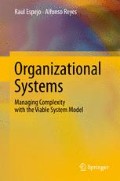Abstract
We, as individuals, are dealing with complex situations, that is, with situations challenging us with a large number of states changing rapidly and unpredictably over time. In all these situations to perform effectively we have to manage the complexity of the situation. This chapter is dedicated to explore principles for managing complexity. We take the view that in general managing complexity refers to our ability to achieve an adequate performance in particular situations of concern. Their boundaries are defined by the purposes we ascribe, implicitly or explicitly, to them. So, in this chapter we explore how we ascribe purposes to situations and why this is important for managing their complexity. The concepts and detailed methods we explain in this chapter are known as variety engineering, which is the key concept that guides our operational design of organizations.
Access this chapter
Tax calculation will be finalised at checkout
Purchases are for personal use only
Notes
- 1.
At that time in Colombia the prosecution and trailing of criminal cases was in the hands of the courts.
- 2.
Cognitive in this context relates to a person’s capabilities for making distinctions and also acting upon them; cognition is not only a mind activity, it is a total body activity.
- 3.
These are similar to the three venues explained for the case of individual management of complexity.
- 4.
These are processes that allow the company to create, produce and regulate its own tasks. We will develop in more detail this concept later on in Chapter 6.
References
Argyris C, Schön D (1978) Organizational learning: a theory of action perspective. Addison-Wesley, Reading, PA
Beer S (1979) The heart of enterprise. Wiley, Chichester
Beer S (1981) Death is equifinal. Society for general systems research 25th annual meeting. Toronto, Canada
Beer S (1985) Diagnosing the system for organizations. Wiley, Chichester
Espejo R (1989) The VSM revisited. In: Espejo R, Harnden R (eds) The viable system model: interpretations and applications of Stafford Beer's VSM. Wiley, Chichester, pp 77–100
Espejo R (2000) Self-construction of desirable social systems. Kybernetes 29(7–8):949–963
Espejo R (2009) Performance management, the nature of regulation and the Cybersyn Project. Kybernetes 38(1/2):65–82
Espejo R, Howard N (1982) What is requisite variety? A re-examination of the foundation of Beer’s method. Working Paper Series: 242. Aston University, Birmingham, UK
Espejo R, Watt J (1988) Information management, organization and managerial effectiveness. J Oper Res Soc 39(1):7–14
Espejo R, Schuhmann W, Schwaninger M, Bilello U (1996) Organizational transformation and learning. Wiley, Chichester
Gorbachev M (1987) Perestroika: new thinking for our country and the world. HarperCollins, London
Habermas J (1979) Communication and the evolution of society. Beacon Press, Boston, MA
Maturana H, Varela F (1992) The tree of knowledge. Shambhala, Boston, MA/London
Prigogine I, Stengers I (1984) Order out of chaos. Heinemann, London
Rockart JF (1979) Chief executives define their own data needs. Harv Bus Rev (March–April):81–93
Tapscott D (2009) Grown up digital. McGraw-Hill, New York
Tapscott D, Lowy A, Ticoll D (1998) Blueprint to the digital economy: creating wealth in the era of e-business. McGraw-Hill, New York
Ulrich W (2000) Reflective practice in the civil society: the contribution of critically systemic thinking. Reflective Pract 1(2):247–268
Whitaker R (1992) Venues for contexture: a critical analysis and enactive reformulation of group decision support systems. Research Report UMADP –RRIPCS, Department of Administrative Data Processing /Informatics. Umeå Universitet, Umeå, Sweden
Author information
Authors and Affiliations
Corresponding author
Rights and permissions
Copyright information
© 2011 Springer-Verlag Berlin Heidelberg
About this chapter
Cite this chapter
Espejo, R., Reyes, A. (2011). On Managing Complexity: Variety Engineering. In: Organizational Systems. Springer, Berlin, Heidelberg. https://doi.org/10.1007/978-3-642-19109-1_4
Download citation
DOI: https://doi.org/10.1007/978-3-642-19109-1_4
Published:
Publisher Name: Springer, Berlin, Heidelberg
Print ISBN: 978-3-642-19108-4
Online ISBN: 978-3-642-19109-1
eBook Packages: Business and EconomicsBusiness and Management (R0)

